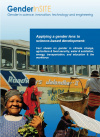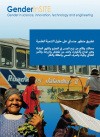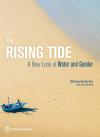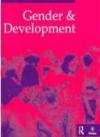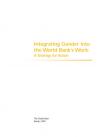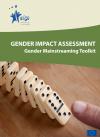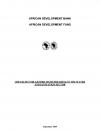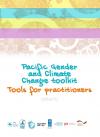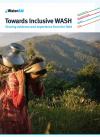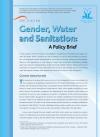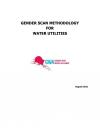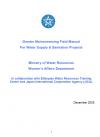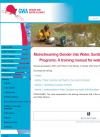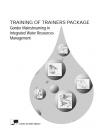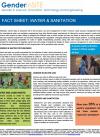Resources
21 Feb 2018
A booklet of fact sheets to provide an overview of the gender dimensions of the six GenderInSITE thematic areas: climate change, agriculture & food security, water & sanitation, energy, transportation, and education & the workforce
TYPE: Fact sheets
21 Feb 2018
A booklet of fact sheets that present an overview of the gender dimensions in the six GenderInSITE thematic areas: climate change; agriculture and food security; water and sanitation; energy;
transportation; and education and the workforce
TYPE: Fact sheets
30 Aug 2017
World Bank/International Bank for Reconstruction and Development, 2017: Report reviews the literature on gender and water, examines how norms and
practices related to water exacerbate gender inequalities, and discusses examples of initiatives that have had intended and unintended consequences for gender
equality.
TYPE: Reports
13 Jul 2017
Oxfam, 2017: Journal issue of Gender and Development focuses on water and sanitation from the perspective of gender justice and women's rights. It highlights the importance of WASH provision for women and girls, examines the gender aspects of WASH in more detail,and considers current policy and programme approaches to WASH that aim to address women’s and girls’ needs and interests.
12 Oct 2016
World Bank, 2002: Strategy identifies gender-related barriers to poverty reduction and sustainable development; and recommends appropriate actions to reduce these barriers; it is intended to establish an enabling environment
to foster country-led, country-specific strategies for changing the gender patterns that are costly to growth, poverty reduction, and human well-being.
12 Oct 2016
European Institute for Gender Equality (EIGE), 2016: Toolkit provides guidance for government and other institutions to assess whether their policies, programmes, action plans and projects reduce, maintain or increase the gender inequalities between women and men.
06 Oct 2016
African Development Bank, 2009: Checklist is intended to guide WASH project managers and implementation teams in identifying, preparing, appraising, implementing, monitoring and evaluating gender-sensitive drinking water supply & sanitation programs and projects, and support national governments in
analyzing and implementing programs and projects.
REGIONS: Sub-Saharan Africa
23 Sep 2016
SPC, SPREP, et al., 2015: Toolkit is designed to support climate change practitioners in the Pacific islands region to integrate gender into their programmes and projects, aimed at climate change professionals working in national governments,NGOs, regional and international organisations who are involved in managing and implementing climate change programmes.
.
TYPE: Case studies, Toolkits
21 Sep 2016
WaterAid with support of Australian Agency for International Development, 2012: Report examines case studies of several groups and shows ways in which people secure their
rights to sanitation and water in countries around the world, including understanding the barriers that they face and how to design interventions to eliminate these barriers.
21 Sep 2016
UN Water, 2006: Brief outlines ome of the major factors that need to be addressed to implement a gender approach to water resources and sanitation management, and suggests actions to promote direct involvement of both women and men at all levels: national governments;
regional/local governments; communities and civil society organizations; donors; and international organizations.
TYPE: Policy briefs
21 Sep 2016
Gender and Water Alliance, 2011: A participatory gender scan methodology guides utility staff to determine the level of gender mainstreaming inside and outside of their
utilities by using objective data and staff perceptions of the achievement of gender equality. It should be used as a tool for achieving long-term overarching targets and
goals for improving gender mainstreaming.
TYPE: Monitoring & Assessment
21 Sep 2016
Ethiopia Ministry of Water Resources and Women’s Affairs Department, 2005: Manual enables regional water sector personnel to easily understand and optimally utilize the gender equality perspective in their day-today operations. It presents gender analysis tools and mainstreaming methodologies to facilitate gender sensitive development in the sector.
REGIONS: Sub-Saharan Africa
21 Sep 2016
Gender and Water Alliance/Rwanda Ministry of Gender and Family Promotion, 2007: Manuel provides participatory gender-sensitive training for water professionals at the policy, project and administrative levels through building their capacity for mainstreaming gender into WASH programs.
REGIONS: Sub-Saharan Africa
21 Sep 2016
Gender and Water Alliance, 2003: Training package provides a detailed account of the gender approach in integrated water resources management for managers, planners and trainers who are concerned with policy development and implementation of integrated water resources management programs and projects.
TYPE: Training
21 Sep 2016
GenderInSITE, 2015: GenderInSITE, 2015: Fact sheet provides at-a-glance overview of gender issues in water and sanitation.
TYPE: Data
- 1 of 2
- next ›




